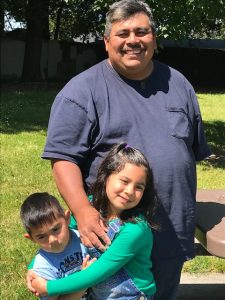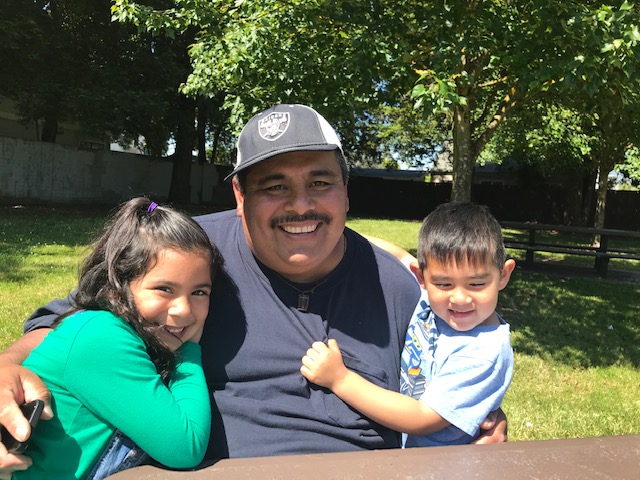Joel Verdejo Flores worked without authorization for nearly five years in California before obtaining a green card that made him a permanent resident in 1995.

He was 20 years old, Bill Clinton was president and moving beyond residency to citizenship didn’t seem like a pressing matter. But that changed in 2016 with the election of President Donald Trump.
As Trump’s supporters continued shouting, “Build that wall,” the Santa Rosa father of two U.S.-born children heard that immigration enforcement was becoming more rigorous. He stopped wavering.
“When the new president entered, I think that a lot of residents got worried and began to look for a way to become citizens,” he told ChicoSol in an interview in Santa Rosa’s Bicentennial Park, a neighborhood playground his children enjoy. “In the airports, they check your record more and detain you more frequently,” he added.
“I didn’t feel safe anymore. I heard that they can take your residency away and deport you.”
Maureen McSorley, an attorney with Santa Rosa-based Vital Immigrant Defense Advocacy and Services (VIDAS), confirmed that becoming a U.S. citizen provides absolute protection. Permanent residents, on the other hand, can be deported, and according to immigration websites, thousands of green-card holders are deported every year, often after committing minor, non-violent offenses.
The number of permanent residents obtaining citizenship has been increasingly steadily since 2014, with almost 757,000 people becoming citizens in 2018, according to the Washington Post.
As a green-card holder, Verdejo said the process to become a citizen moved quickly once he made the decision.
He made his request in late 2017, was fingerprinted and given the official application in March 2018, interviewed in April 2019, and swore allegiance to the United States a few weeks later, on May 15.
“Everything happened in just over a year,” he said.
Verdejo’s father, who had gone back and forth between Oaxaca, Mexico, and Sonoma County, Calif., for many years before he became a resident and brought his family north, became a citizen about a year ahead of his son. Verdejo said his father became a citizen for the same reason as he did: A sense of insecurity that non-citizens feel in the Trump era.
He believes residents wanting to become a citizen should follow in his footsteps. “They shouldn’t be afraid,” he said.
(In Butte County, Butte College offers a citizenship class to help permanent residents through the process. Classes are offered in Santa Rosa through Catholic Charities and at Petaluma Adult School.)
He said the interview with an immigration officer was easy – she checked to see if he gave the same information provided on his written application and asked six simple questions about U.S. history (such as who was the first president and who was Martin Luther King, Jr.). Finally, he had to read a question on a computer screen (When is Columbus Day?) and type the answer.
Verdejo’s citizenship case moved quickly because his immediate family members are citizens. His wife, who came to the U.S. as a 1-year-old infant, has been a citizen since 2000 and his two children were born in California.

Applications for the prerequisite green card, however, can require very long waits, particularly for Mexican nationals. (There is a country-of-origin quota system.) Chico attorney Sergio C. Garcia waited for more than 20 years after his green-card application was approved, which is commonplace.
McSorley said requests for permanent residency that are backed by family ties can fall into any of five categories, depending on the age of the applicant and their relationship to the family member. Cases are treated differently if the sponsoring relative is a U.S. citizen and not just a green-card holder.
It’s important, she said, to seek help from an attorney and perhaps talk to more than one. Some people go to notaries instead and although they are not supposed to give legal advice, some do.
Asked what he thought about Trump’s plan to eliminate what the president calls “chain migration” in which family members are given special consideration, and instead prioritize educated, skilled workers, the former field worker responded swiftly. “What about the people who produce food?” Verdejo said.
Verdejo is now a stay-at-home dad who plans to re-enter the job market once his youngest child starts school. He expects that being a citizen will help him get a better job, probably in the landscaping business.
But the most important thing, he reiterated, is that he feels more secure as a U.S. citizen. “I think becoming a citizen was a good idea,” he said.
Lindajoy Fenley, a bilingual journalist who has worked in both Mexico and the United States, is a contributor to ChicoSol.
